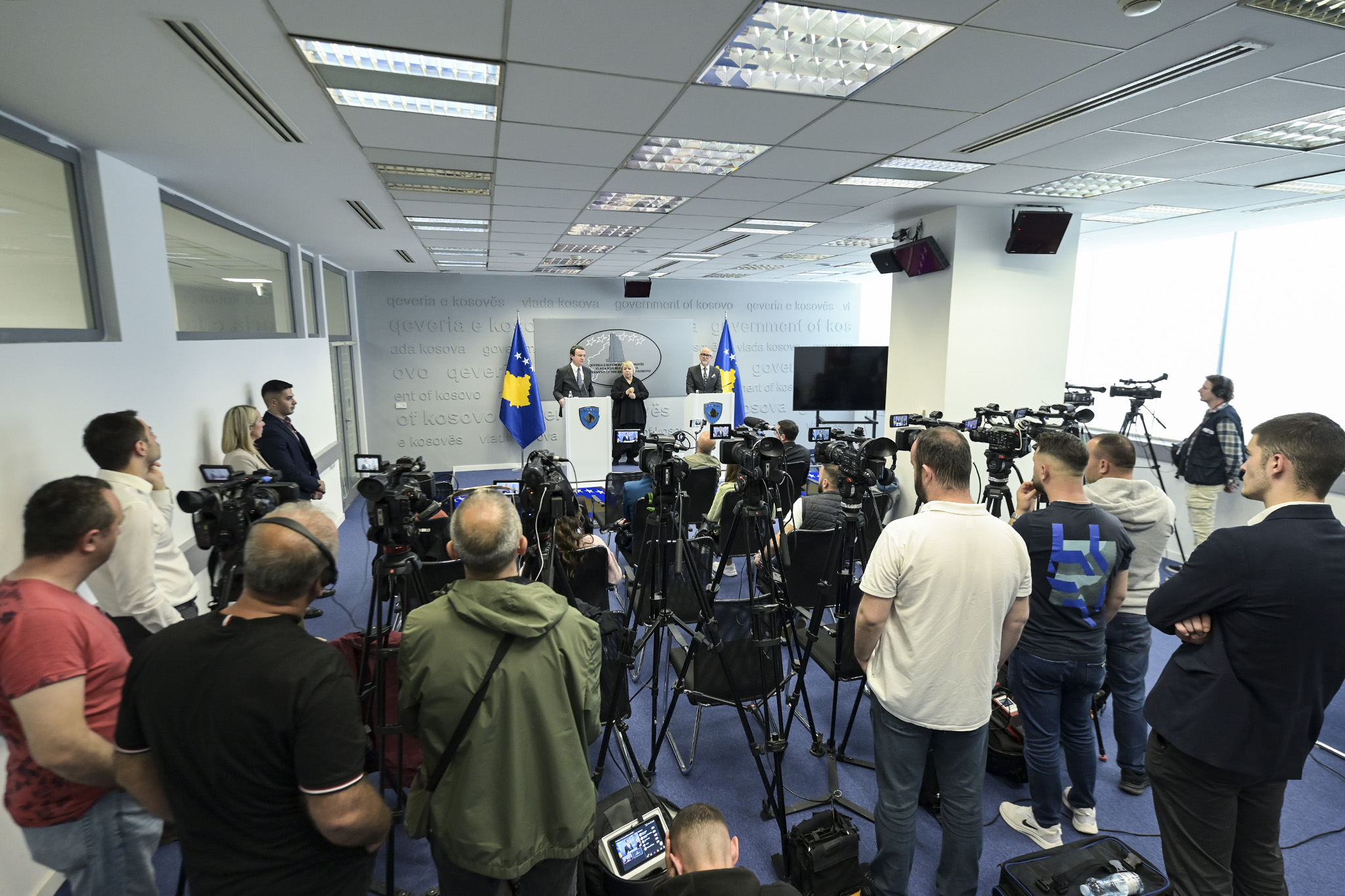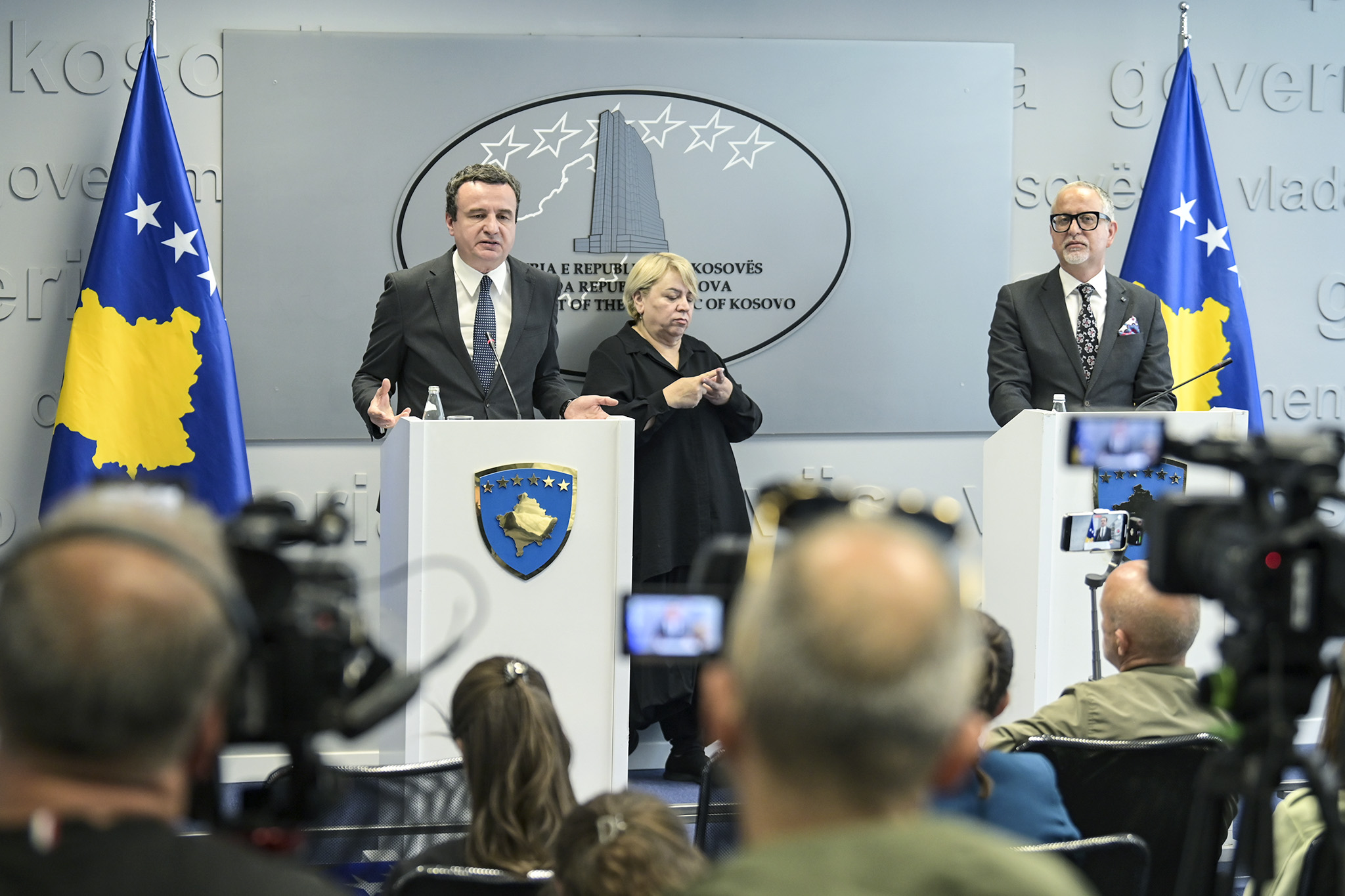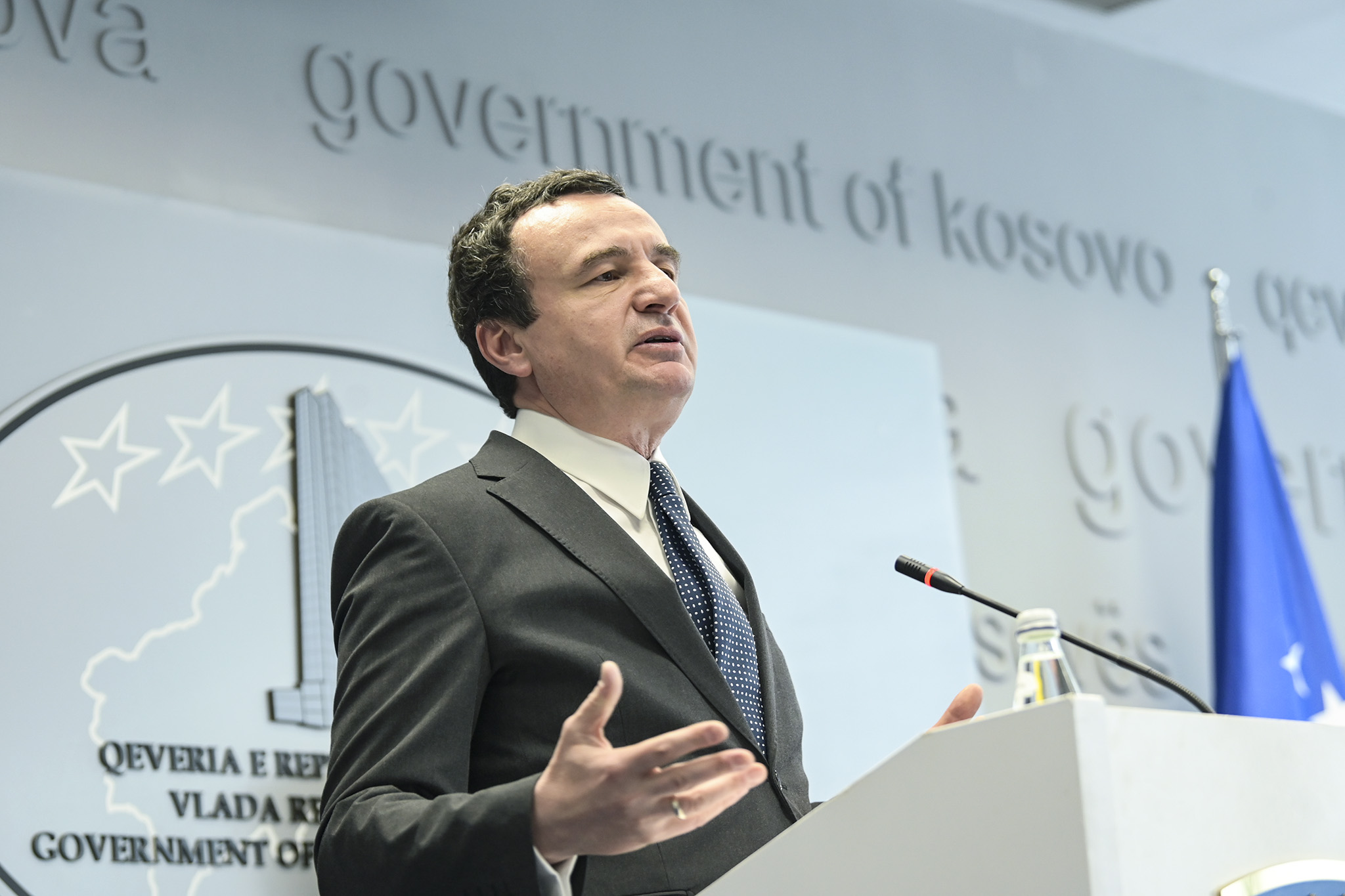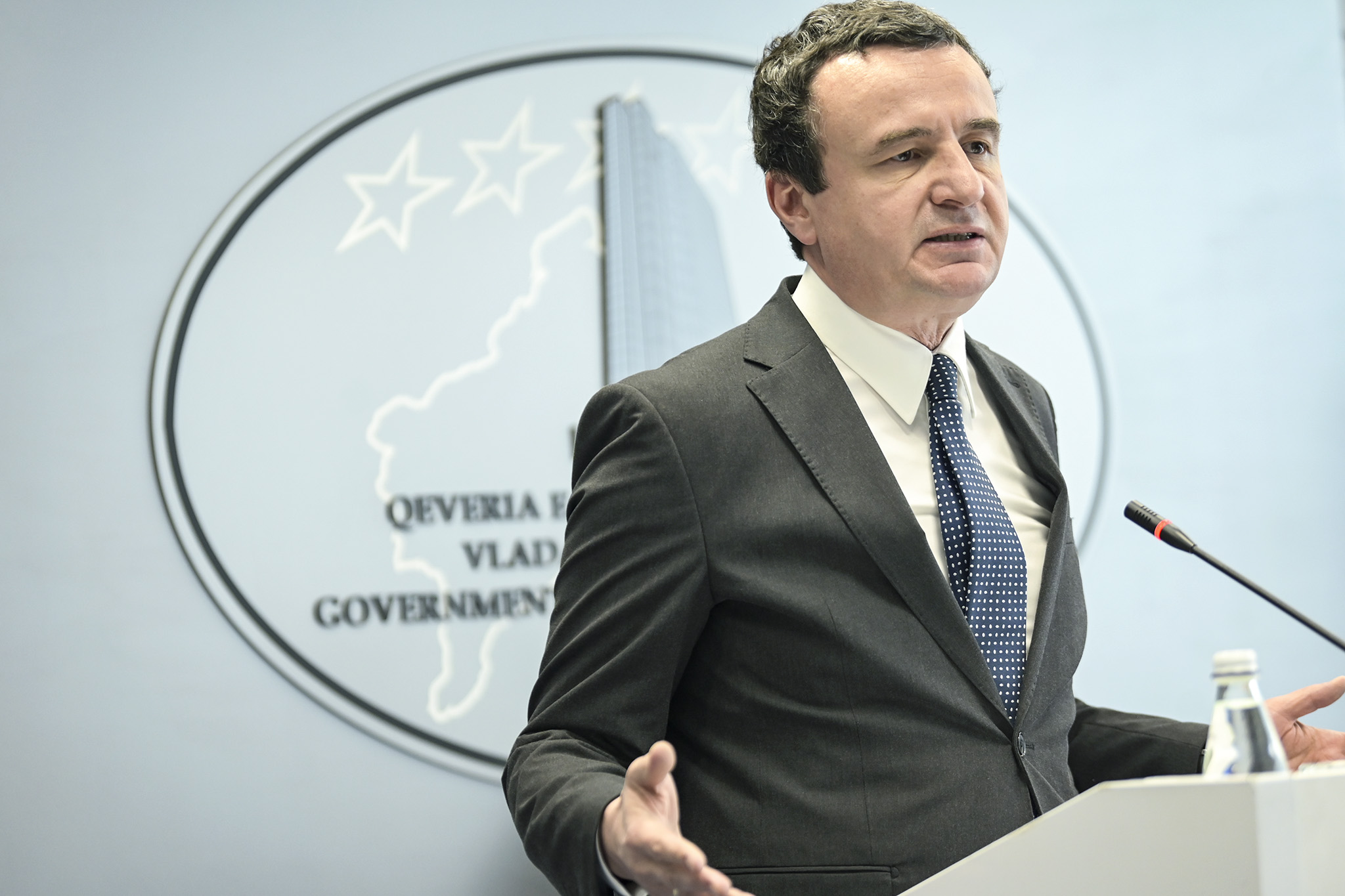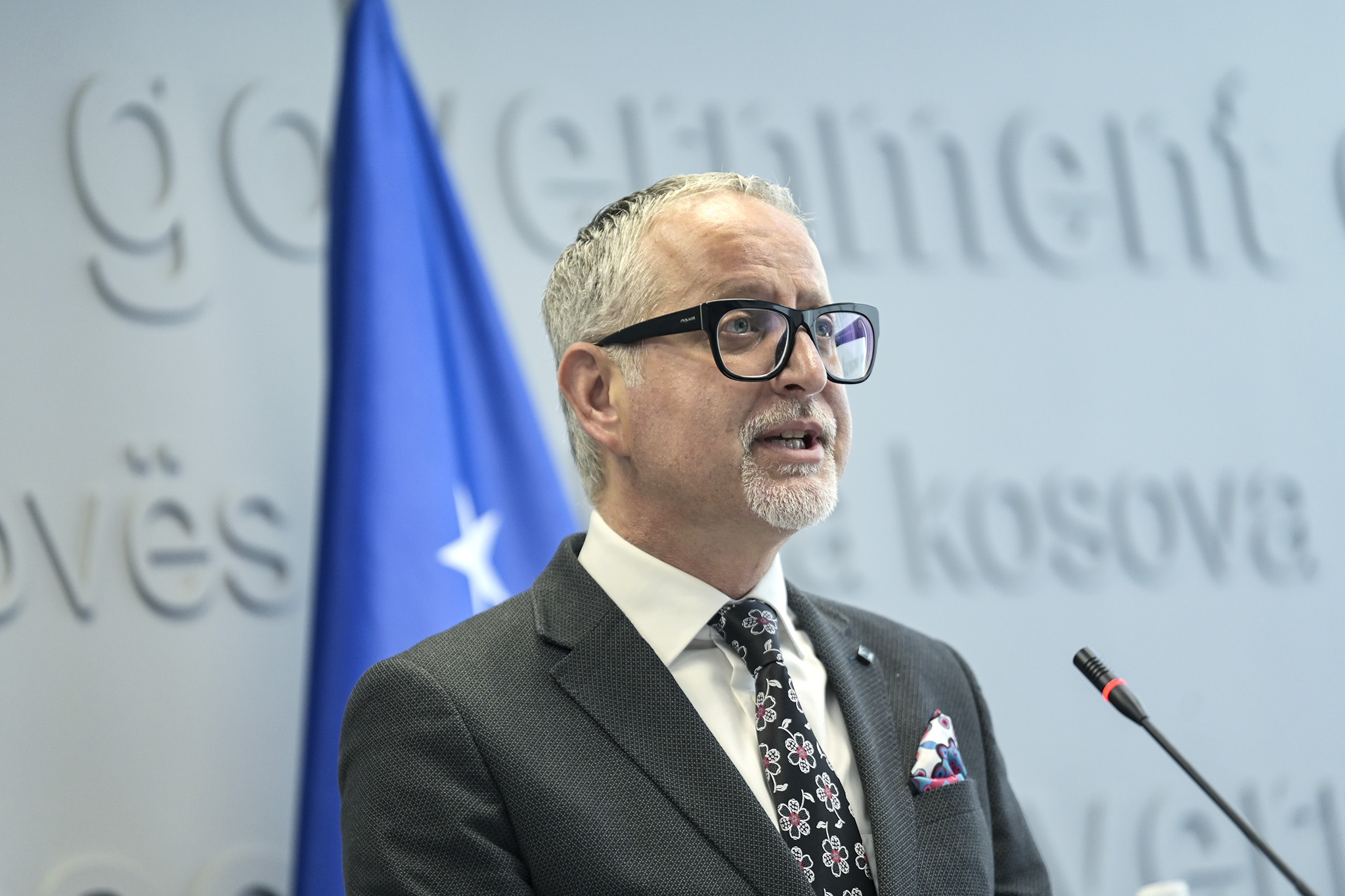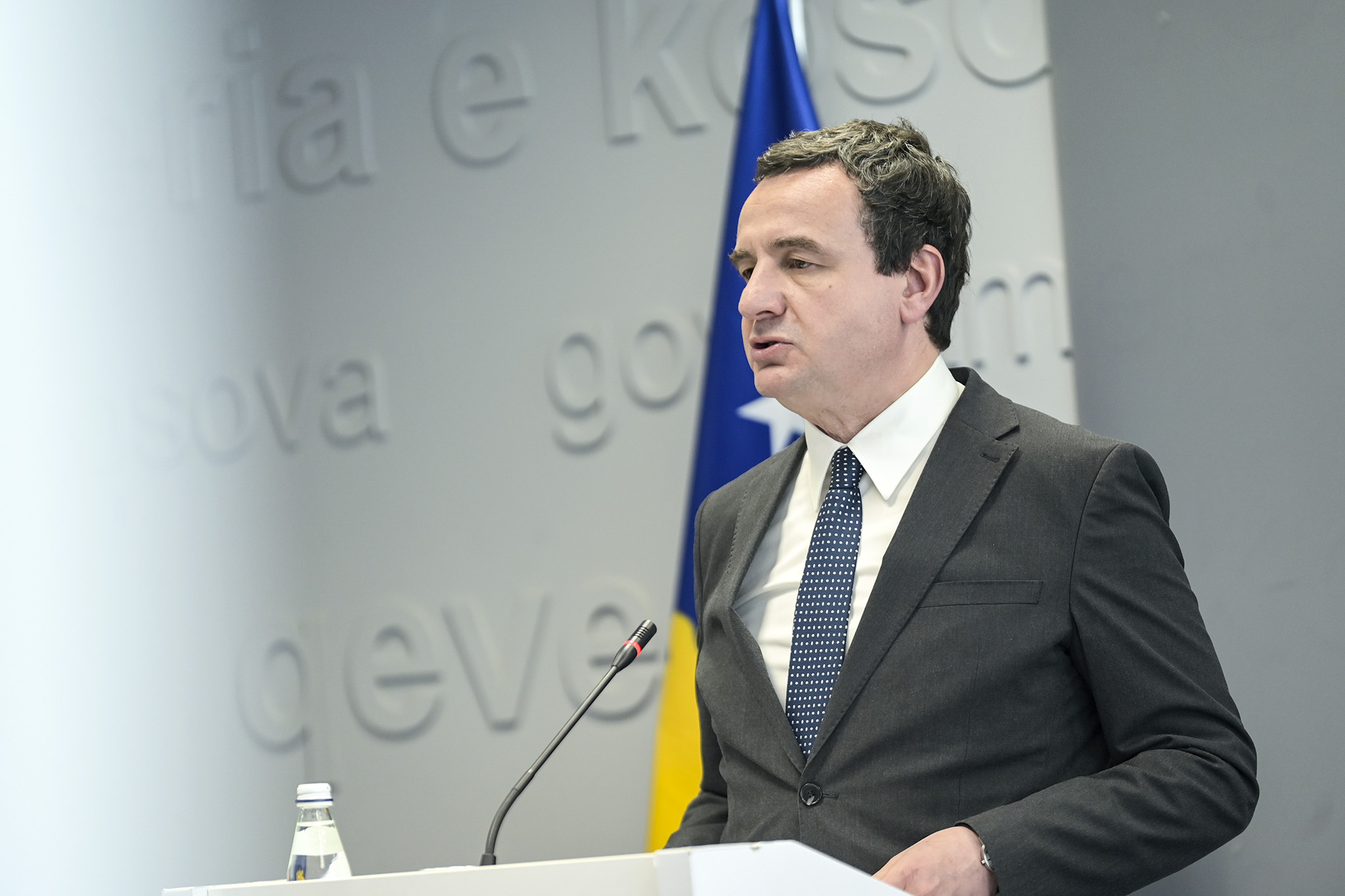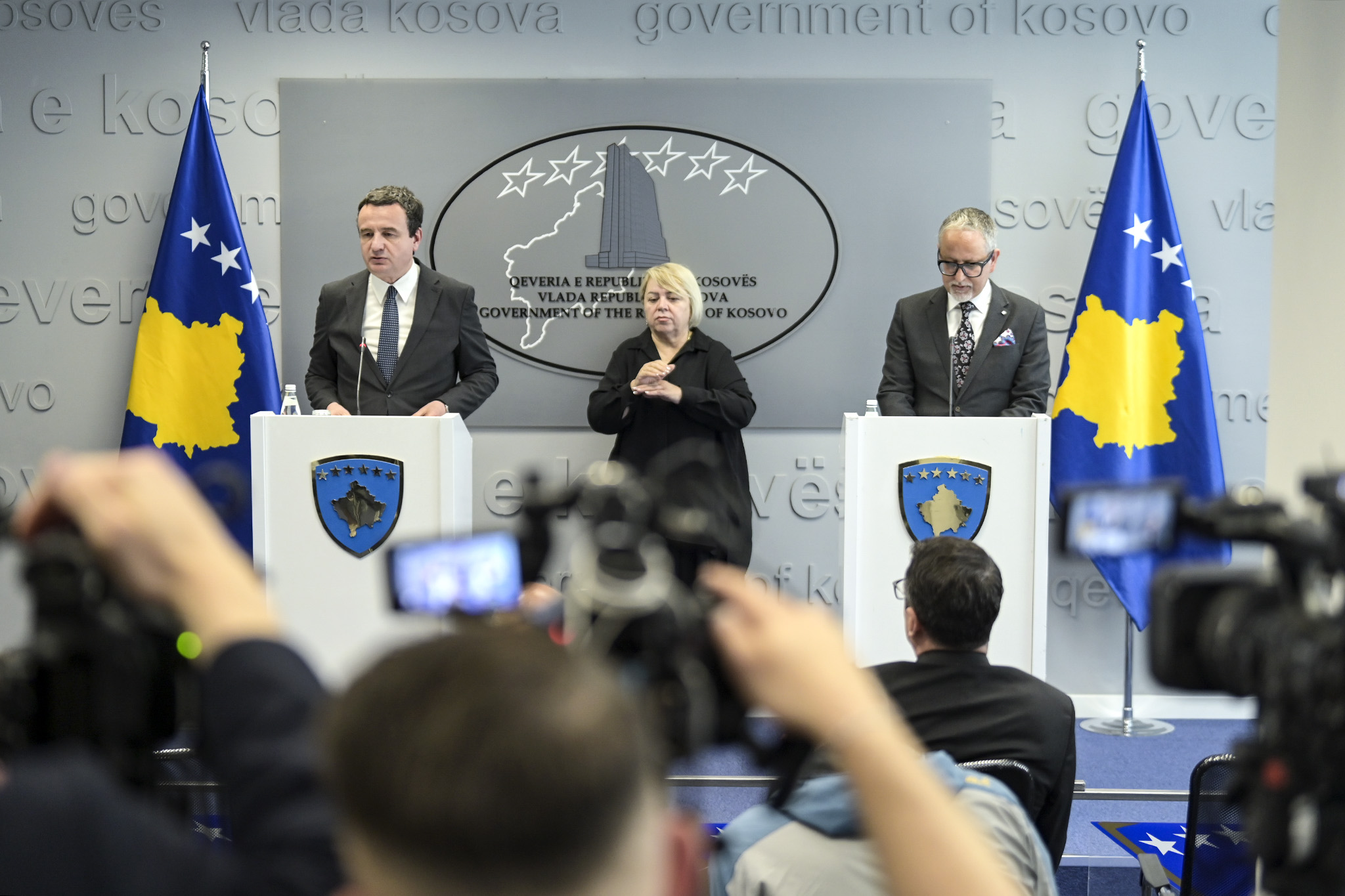Prishtina, 8 May, 2024
Dear citizens,
Honorable representatives of the media,
We have just concluded the 203rd session of the Government of the Republic of Kosovo. We made a total of 22 decisions, bringing the total number of decisions made by our democratic government to 1799, demonstrating good governance.
Today, among them, we had draft laws, draft regulations, administrative instructions, and proposed decisions in various fields.
At the beginning of the session, we approved the Draft Law on Banks, which aims to regulate banking activity in our country, and at the end of the session, we approved the Draft Law on Air Navigation Service Provider.
Among these, we approved Regulations sponsored by the Prime Minister’s Office, for the protection, physical security, and management of classified information. Then, we also approved the Regulation and Administrative Instruction for Determining the Rules and Procedures for Covering Expenses for Educational and Health Services for Children with Disabilities and the ways of institutional cooperation with non-governmental organizations for the implementation of policies and for the rights and provision of services for child protection.
We allocated to the Municipality of Gjilan a plot of 5000 square meters, where the construction of the High School of Medicine and the Object for Daily Stay for the Elderly is planned.
We allocated or reallocated, respectively, 4 million euros, aiming to implement 33 projects in beneficiary municipalities under the Donor Co-Financing Program for the grant scheme based on municipal performance.
We completed the final expropriation of properties related to the construction of the Prizren-Tetovo road, namely the segment Struzha-Kyçja with the “Ibrahim Rugova” Highway. Similarly, we voted on the expropriation of properties related to the construction of the “Central City Square” in Rahovec and those affected by the project “Creating spaces for traffic and pedestrian mobility” in Prizren.
We established four commissions, one for professional assessment for the selection of the executive director of the Anti-Doping Agency and another for the position of the general director of the Civil Aviation Authority of Kosovo, and two respective commissions for the selection of the candidate for the Secretary-General of the Ministry of Defense and the candidate for the Secretary-General of the Ministry of Local Government Administration.
Additionally, we approved the agreement for air services with the Government of the Kingdom of Saudi Arabia, through which we aim for more efficient and competitive international air services, which increase trade, consumer welfare, and contribute to economic growth.
Now, before we answer your questions, I will pass the floor to the Minister of Health, Arben Vitia.
Question: Prime Minister, by diverging from the recent development from what you said in the Government Meeting, you openly opposed the draft to be sent to the Constitutional Court, and you openly conditioned some EU countries, Germany, France, Italy, and others who are demanding the establishment of the Association as a prerequisite for membership in the Council of Europe. You opposed precisely seven days before the Meeting of the Committee of Ministers of the Council of Europe. Does this mean that Kosovo is ultimately risking its membership in the Council, firstly?. Secondly, does this mean that Kosovo is heading towards isolation in joining international organizations as a signal that the European Union had given that without the establishment of the Association, there is no path to integration and Kosovo risks isolation?. And does the Government have a Plan B, Prime Minister, to draft its own statute draft to then send it to the Constitutional Court, adding here readiness from the President, who had said that Kosovo together with the United States should establish or draft its own and then send it to the Constitutional Court. Thank you!
Prime Minister Kurti: First, we have fulfilled all standards and criteria; we have met all prerequisites, and this has been confirmed by the Parliamentary Assembly of the Council of Europe. The request to send the draft statute of Lajčák and other envoys to the Constitutional Court of Kosovo has been rejected three times by the institutions of the Council of Europe. The first time in Paris on March 27 at the Council for Political and Democracy Affairs. The second time in Strasbourg on April 16, again at the Council for Political and Democracy Affairs, and the third time within the framework of the Parliamentary Assembly, which had that plenary session. So, this request has been rejected three times.
On the other hand, there is a letter of guarantee that we have all three signed together, heads of state institutions, Madam President Osmani, Mr. Chairman Konjufca, and myself as Prime Minister, in which, as requested, we have stated that the Basic Agreement, the Implementation Annex, one from Brussels, the other from Ohrid, and without excluding Article 7 linked to Article 10, which includes the Association of municipalities, come after accession, and we do not deny them and we are ready to respect and implement them. However, this would be the case if on October 26 of last year the package of agreements were signed by the president of Serbia, and by me. If the package of agreements were signed, then that draft statute could go to the Constitutional Court.
For a draft statute to be taken out of the package, to be placed at the center of importance and as a top priority is not possible, it is not possible without destroying the package. One article cannot be placed in connection with another from 11 articles in total, plus the Implementation Annex artificially, arbitrarily, as a priority without destroying the package. So, I am in defense of the Basic Agreement and I am reiterating as if in some earlier responses and in some interviews this year that it is not possible from the perspective of the Government of the Republic of Kosovo to talk about the Association of municipalities without starting with the Basic Agreement and the Implementation Annex. So, the logical order of things, the political order of agreements, is like this.
On the other hand, on March 18 of last year, when we were in Ohrid, I offered to write the draft statute. The draft statute with three pillars. But, I said let’s agree once on the pillars, the first pillar is the Constitutional Court ruling from December 2015, the second pillar is the European pillar, the letter of Mrs. Federica Mogherini from August 2015, and the third pillar is the American stance published by Cholet and Escobar in January of last year. So, with these three pillars, if you agree, I am writing the draft statute, that’s what I said. They didn’t want to hear about this and moreover, I was told that the draft statute should be written by the Management Team. The Prime Minister doesn’t write the statute, they said, but the Management Team writes the draft statute. My observation was that I am the Prime Minister now. If you are talking about the Management Team, and I am the manager as the Prime Minister, I can write this. The Management Team shouldn’t write it.
On May 2, we went to Brussels, the Management Team, presented primarily by Mrs. Daniela Vuiqiq, Republic of Srpska 2.0, maybe even something more, because Serbia didn’t accept Kosovo, while they considered that the Association should also control Kosovo’s natural resources. Something that the Government doesn’t have the right to. For example, we have the Independent Commission for Mines and Minerals, it’s not interference, I mean, interference that belongs to the state and the parliament, not just the Government, except they were taking power from the municipalities. Even the internationals saw that in that Management Team there is nowhere to go.
I proposed a concept idea based on the Croatian model, so I proposed this, but this was rejected. Because Serbia and Croatia have normalization agreements there it’s called the National Council of Serbs. There is a National Council of Serbs in Croatia and the one of Croats in Serbia and since both Serbia and Croatia emerged from the war and from former Yugoslavia and Croatia is a member country of the European Union and NATO, I took an example from within the official Belgrade experience, but this was rejected.
So, it was rejected that I write the draft statute based on the three pillars I mentioned, it was rejected that I write the draft statute based on the Croatian model. These two refusals occurred, and the signing of the package was rejected on October 26. We cannot go back to 2013 now. And today, as we speak, it’s May 8, not March 8. Between March 8 and May 8 are two months and in these two months, the requests to make it a condition or prerequisite for Kosovo’s membership in the Council of Europe have been rejected three times. We are talking about a topic that has been voted down three times, twice in the Council for Political and Democracy Affairs and once in the Parliamentary Assembly of the Council of Europe, so we find it impossible to do more in this direction because we are also in conflict with the Parliamentary Assembly of the Council of Europe.
What have we done? We have sent the letter of guarantee at the highest level, the president, the speaker of the parliament, and myself. Now we are waiting for everything to go well by May 17, but as you know, it doesn’t depend solely on us. It depends on those who vote there. It means, it’s the member countries which with their foreign ministers will have their say.
Now, for three years as prime minister, it’s constantly said, ‘Is Kosovo isolating itself because of trade, is Kosovo isolating itself because Lulëzim Hetemi went to the office in Leposaviq’. Kosovo is not isolating itself. It means we uphold the position of the Republic of Kosovo, constitutionality, legality. So, we must be principled, sensitive also to the requests of our allies and partners, but above all, we have the law, the Constitution, and our public interests. We collaborate with international factors and have constantly development and democratization projects with them, even with skeptical states and even with unrecognized states. It means isolation is nowhere. You know how can we talk about isolation when visa liberalization happened this year. On January 1, 2024, isolation was broken. So, we constantly talk about isolation, yet visa liberalization happened this year.
Question: Prime Minister, today the Council of Europe, two hours ago, returned us an answer, that so far the issue of Kosovo has not yet been placed on the agenda of the Council of Europe. After your recent stance regarding the association, do you believe that at least Kosovo will be placed on the agenda for May 16 or 17 and also if it’s just placed, do you believe that now we will have the votes of France and Germany?
Prime Minister Kurti: I believe if it depended on me it would be decided. It would be put on the agenda and it would be put FOR Kosovo. With 82 percent the Parliamentary Assembly has voted in favor of Kosovo, 131 were for, 29 were against. But I cannot take that role to speak on behalf of the states there. It is good that they are asked about this. What has Kosovo not fulfilled? Why does the eminent Jurists’ report state as clearly as possible the highest assessment for Kosovo? Let me just mention it in three points: “Kosovo’s aspirations for membership in the Council of Europe must face a positive response,” the quote concludes. Or another quote “Kosovo’s legal framework is largely in line with the standards of the Council of Europe and its Constitution is a very progressive instrument”. Internationals have said about us, if we were to say it about ourselves, maybe someone would doubt it, but they have said it about us. Or another, the Parliamentary Assembly of the Council of Europe has drawn this conclusion. Again quoting regarding the association: “The Assembly considers the establishment of the Association of municipalities with a Serb majority as an important step and a way to increase the participation and democratic empowerment of Serbs in Kosovo and to ensure the protection of their rights. The Assembly considers that the establishment of the Association should be included in the future consideration by the Committee of Ministers of Kosovo’s application for membership in the Council of Europe, as a commitment following Kosovo’s membership”. After the membership. What should we do now? They have written these themselves. So the eminent Jurists, the Council for Political and Democracy Affairs, the Parliamentary Assembly, have said these things about Kosovo, not Kosovo about itself. And now we are repeating what they said as quotes. We have nothing else to do or more.
And I hope for the best in the days to come and for May 17, but once again I emphasize that the answer to the questions about what will happen with Kosovo’s membership is no longer in Pristina. It doesn’t depend on us. Kosovo has fulfilled everything. Kosovo has experienced a lot of injustices in the past and present, but we are not responsible or to blame for this. We have fulfilled everything, black on white. It says very clearly in their reports and documents.
Question: Good day, Ana Markoviq, First Television. The fact that you now mention that you will not send that draft statute to the Constitutional Court and the fact that we have had some unsuccessful talks about the dinar in Brussels, does this mean the conclusion of the dialogue? Thank you.
Prime Minister Kurti: We have a very great success from the dialogue, which is the agreement, we have the basic agreement from Brussels since February 27 last year, then the implementing annex from Ohrid also from last year on March 18, so we have gone much further than the dialogue as such, because we have an agreement. The dialogue is a dialogue for an agreement and we now have an agreement. The problem is that Serbia has never respected that agreement, it has violated and re-violated every clause of that agreement, at least 8 out of 11. Now it’s difficult to execute, to implement an agreement that is not respected, so I have always insisted that the agreement be signed as a guarantee for respecting and implementing it. If on October 26 last year, the President of Serbia would accept to sign that package of agreements, which would include this draft statute, for which I had given my significant remarks to Lajčák two days earlier, on October 24, then that draft statute could have been transmitted by our government to the Constitutional Court, but as it stands now, it’s like a non-paper, it’s like a working document, it’s like a draft that they still consider, and it’s like a working document, it’s not an official document with signature or seal and goes to our Constitutional Court and furthermore, it’s not Kosovo’s document, it’s an international document. An international document can go to any international instance, but it cannot go to our Constitutional Court. In our Constitutional Court, this would be the case if we were to sign on October 26, that package of agreements where there is a basic agreement, an implementing annex, and this draft statute. We have given a guarantee with Madam President Osmani, with the Speaker of the Assembly Konjufca, with Mrs. Bakoyannis, everything that has been requested from us we have fulfilled. Now we hope for the best on May 17, but that draft statute is not Kosovo’s document and cannot be extracted from the package and thus destroy the basic agreement, nor can it be somehow placed at the center or as a priority above all other clauses of the agreement because the Ohrid Agreement does not allow it. The Ohrid Agreement says that no clause is more important than another. This is the principle of implementation. Now, whoever wants clause number 7 or number 6 or number 4 to have priority over other clauses, this is in contradiction with the Ohrid Agreement.
Question: On May 11, the implementation period of the Ten-Point Plan, which the Central Bank of Kosovo published to facilitate the issue of the dinar for Serbs living in Kosovo, also ends. What will happen after May 11, considering that this period has been calculated as a transitional period? Will there be a more concrete plan or only concrete results will be expected from the meetings held in Brussels? And, finally, if you can provide a brief comment on cyber attacks from Russia against Kosovo institutions, for which the Minister of Foreign Affairs, Donika Gërvalla, has also reacted.
Prime Minister Kurti: After May 11 comes May 12 and so on, specifically regarding the issue of the dinar, which we have not stopped as such, but as a means of payment, and this has been done by the Republic of Kosovo and not by the Government of the Republic, because it has been done by the Central Bank of Kosovo with the new regulation. They are even higher than us and ahead of us in the future. So, just like for these elections organized in the north, in the four municipalities on April 21, when we had the CEC, the Central Election Commission higher than us and ahead of us, also for the issue of the dinar, we have the CBK, the Central Bank of Kosovo higher than us and ahead of us.
There have been continuous efforts to put me in a position where I decide even for the Central Bank of Kosovo, for their decisions and so on. This happens in dictatorial states, this happens with authoritarian regimes. We are a democratic state. The Governor of the Central Bank of Kosovo is voted in the same hall where I was voted. He doesn’t report to me. He reports to the Assembly of the Republic, so I cannot override the governor. We must preserve our republic, the separation of powers, which is essential for the democracy of the country. Therefore, for the issues that the Central Bank of Kosovo has decided and the implementation plans with phases and deadlines, they answer. We are here to support them, not to lead them.
Meanwhile, whatever my deputy, the Minister of Foreign Affairs and Diaspora, Mrs. Donika Gërvalla, has said, it is also my stance. She spoke on behalf of the Government of the Republic of Kosovo. It is true that some of our institutions’ websites have been down for a certain period. They have returned. There have been DDoS cyber attacks, which seem to come at least from the Russian Federation, maybe from other tools, which they have spread around our continent, but their aim is hybrid warfare, which would result, if successful, in destabilizing our security institutions, stability, and the conduct of affairs. So, Donika Gërvalla Schwarz has given her position on behalf of the Government that I lead.
Question: You also mentioned in the meeting, but also here at the conference, that some spaces of the hospital have been allocated to the Municipality of Gjilan, among other things for the construction of a daily care facility for the elderly. I’m interested in Mr. Vitia, if the Mayor of the Municipality of Gjilan has informed you that for three years there has been a complex there with nine facilities called “Happy Village” and that it is underutilized and dedicated to the elderly and some other sensitive categories. So, the question is why invest in other facilities, while there are existing ones and if you have a plan for the functionalization of those facilities?
Minister Arben Vitia: Thank you very much. If they are owned by the Municipality of Gjilan, I believe this question should be addressed to the Municipality of Gjilan. In the meeting and in response to the request from the Mayor of the Municipality of Gjilan, it has been well reasoned why a high school of medicine should be built in this municipality, and, of course, with great pleasure, considering the education of professionals in the future, we have accepted this. The other part of the parcel is for the daily care of pensioners, also taken into account by other centers, where such centers have been opened, and if you remember during the years 2017-18 also in the Municipality of Prishtina, where such centers have influenced not only health but also well-being, socialization of pensioners and elderly people, of course, when there is such a contribution and such an effect on this category of society, very important in our society, we have only allocated this part of the land, where I am very sure that the mayor will also make a good school, with laboratories and as it should be, but also a very pleasant environment for the elderly category for the Municipality of Gjilan.
Last modified: May 13, 2024
